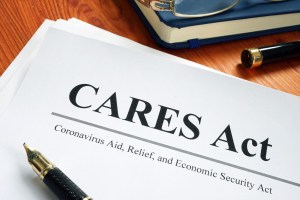The Cares Act & What Real Estate Investors Can Do Right Now

Last week Lynn Dee Murrow, successful investor and Executive Vice President joined our radio hosts on the Lifestyles Unlimited Real Estate Investor Radio Show
The following are highlights of their Q&A sessions to help you navigate the quickly changing world of real estate investing during and after the pandemic.
What’s Covered in the article
Executive Vice President, Lynn Murrow
When you’re working with your residents during times of crisis be human, be compassionate. If they have taken good care of your property, historically paid their rent on time, and you want your relationship to continue when this is all over, talk to them as soon as possible. Make sure they’re OK. Are they ill? Is anyone in their family ill? Are they still working? Are they working from home? Have they lost their jobs? Are they furloughed or did their company close their doors forever? What is their current circumstance, and what do they think will happen to them when businesses open up again?
Even if a resident has been a problem in the past, perhaps this is a wakeup call. Give them the opportunity to work with you more constructively by extending the same compassion to them in your conversation, even if you feel they have not earned it.
Now you can work with each resident to solve the problems in front of them right now and help them keep their heads up to see the opportunities out there as well. Help your residents see this is likely to be a short-lived crisis, a matter of months. It will not last forever. Even if their employer will not be reopening, they have the chance to get their resume or application in front of many employers as they are getting ready to rehire and reopen.
Then, you can start working on the math.
No matter what you hear on TV or Radio, you have to focus on what happens to individual people because ultimately that’s what matters. What happens to the individual who has either temporarily or permanently lost their job, been furloughed or had their hours cut or pay reduced? Well, they’ve got a lot of chatter around them. This might be you. Maybe you’ve lost your job. One of the things that we hear, if we’re renting, is that you don’t have to pay rent. Then, you hear some counter statements from mayors, governors, and local apartment associations saying you do have to pay rent. How do you know what to do? There are all kinds of ideas out there to help people who have been financially impacted by COVID-19. The question is, do they really help them in the end?
So, let’s go through what can happen to residents right now, because you have to do the math with them so they can find the best solution. First, it is important we all understand there is no free rent. That sobers up the conversation a bit, but I think everyone can understand that even though this is not their fault, it is not their Landlords fault either. They have a business to run including a mortgage, interest to the bank, insurance, property taxes, payroll for the on-site team and others behind the scenes, supplies and the cost of maintaining the property. This is a novel event, and there is no one around to blame and pick up the bill. We have to work through individual solutions so we all can recover quickly when this national crisis is over.
To make the math easy, let’s say the rent is $1,200 a month. On top of that, there are all these other bills that could potentially be deferred. But let’s say just rent is pushed off and not paid for two months. So that’s $2,400 in back rent that hasn’t been paid. When you begin to pay rent in full again, some arrangement has to be made to pay back the $2,400 in rent that was deferred. Let’s assume the landlord and resident agree to extend the lease for another year so deferred rent can be repaid over 12 months. $2,400 /12 months = $200/month. For a year this resident must pay their $1,200/month rent plus the $200/month to repay deferred rent.
$200/month is a car payment for some people, for others $200 can pay their utilities and cable/internet bill and maybe even their cell phone bill too. Most people are living paycheck to paycheck making it impossible for them to catch up on deferred rent. To make this situation even more difficult, most people live where they want to live. They’re happy there. They love the neighborhood. Their kids go to school there. They love the community. How can this be reconciled? If we cannot find a better solution they will have to move, or be evicted, and find a new place to live during one of the most stressful times of their life as America tries to restart our economy.
The good news is yes, there are things we can do as landlords to help residents weather this storm and pay all or part of their rent to avoid the reality this ugly math has revealed.
First, let’s look at resource’s residents can use to pay rent, or part of their rent, so it will be easier to catch up when this crisis is over. This is the winning strategy for both of you. It has to be a mutually beneficial solution.
Provide suggestions on getting deferrals or forgiveness of monthly bills during this crisis. Residents can defer car payments. The CARES Act allows them to stop paying their student loans until this crisis is over. They should ask for forgiveness or deferral of utility bills. They can call their cell phone provider and their TV/Internet provider too and ask for help. There may be resources in the community to provide food, help pay rent, and provide other assistance. Help residents locate these resources. That’s what good Landlords do. That’s what Lifestyles Unlimited members do.
Remind residents that they can apply for unemployment even if they have not been fired. If they have been furloughed, had their hours reduced or their pay cut they can apply. They can also apply if they are an independent contractor with negative financial impact from COVID-19. Landlords can agree to waive late fees until unemployment benefits arrive. The CARES Act adds up to $600 a week in additional benefits which will allow most families to cover their bills including rent.
The CARES Act allocated money for all taxpayers. Payments are being deposited into bank accounts now. For those who do not make enough to file taxes, they can submit their information to the IRS so they receive this CARES Act benefit, which should cover most if not all of one month’s rent.
The CARES Act also provides for extended benefits from employers that residents should ask about. These benefits can extend pay for those who are ill or have a family member who is ill form COVID-19 and requires the residents care; those who have young children and schools and child care facilities are closed; those who have been furloughed and their employers have received Payroll Protection Program funds. These programs were designed to maintain payroll so employees can pay their bills.
For residents who are communicating and working with you consider waving late fees and accepting partial payments. Craft a mutually beneficial solution and sign a written waiver of late fees and payment plan so you both have a record of your agreement.
The CARES Act has placed a 120-day moratorium on evictions for non -payment of rent. It is important to know that this only applies to Landlords who have a federally backed loan or participate in federal housing programs. Once that moratorium is over, these Landlords must give a 30-day notice to pay or leave before filing an eviction. For Landlords who fall under this moratorium in the CARES Act the earliest they can file for eviction for non-payment of rent is August 29, 2020. They can, however, file for eviction for other lease violations, threatening or violent behavior and illegal activity. Once this timeframe has passed, Landlords will still be subject to any State and Local restrictions.
For the rest of America’s Landlords who do not fall under the CARES Act, they must refer to their State and Local government for direction on eviction moratoriums and re-opening dates for local eviction courts.
Finally, a financial resource for everyone negatively impacted by COID-19 is provided in the CARES Act which allows you to withdraw up to $100,000, or 100% of your vested amount whichever is greater, from your 401K or IRA without the 10% early withdrawal penalty. You will have 3 years to redeposit these funds back into your account or you can spread out your taxes on this withdrawal over three years. You can take advantage of this benefit until the end of this year.
For instance, if a couple both have independent IRAs, and they are both vested in this amount, they can each withdraw up to $100,000 without the 10% penalty. They can plan their tax strategy and pay the taxes on these funds over the next 3 years. Call your plan administrator for more details.
This is the best opportunity I have ever seen to withdraw your money from 401K and IRA plans. This is an opportunity to get this money working for you. But remember, it’s your retirement money. You want to use it in a way that’s making you money.
Congress is working on the fourth relief package right now! Lifestyles Unlimited has join with the National Apartment Association, the state associations, and the local associations in communicating to our lawmakers what is happening to workforce housing providers during this crisis. We need to reach out in mass because our legislators need to provide a better financial backstop for renters and landlords.
We have about 50,000 members of Lifestyles Unlimited and we have asked them, and now we are asking everyone, to send emails to their legislators asking for help. It’s very, very easy. There’s a place for you to fill in your message, then you put in your address, and it fills in who your lawmakers are, then sends your email to them. It’s fabulous. You’ll find that email template from the National Apartment Association right here: https://bit.ly/3enj1b6
Lifestyles Unlimited is a real estate education and mentoring program. If you are just getting started or a seasoned investor, we can help you create the wealth and passive income you need to live the lifestyle you desire. We have seen many chaotic markets during the last 30 years, we see opportunity ahead and we don’t want you to miss out. Join us for a virtual Free Workshop to find out more at https://bit.ly/3as37J9. If you know you are ready to become a member of lifestyles Unlimited and get started right away go to https://bit.ly/2KrQDXu and enter the discount code LYNN for a great offer.






